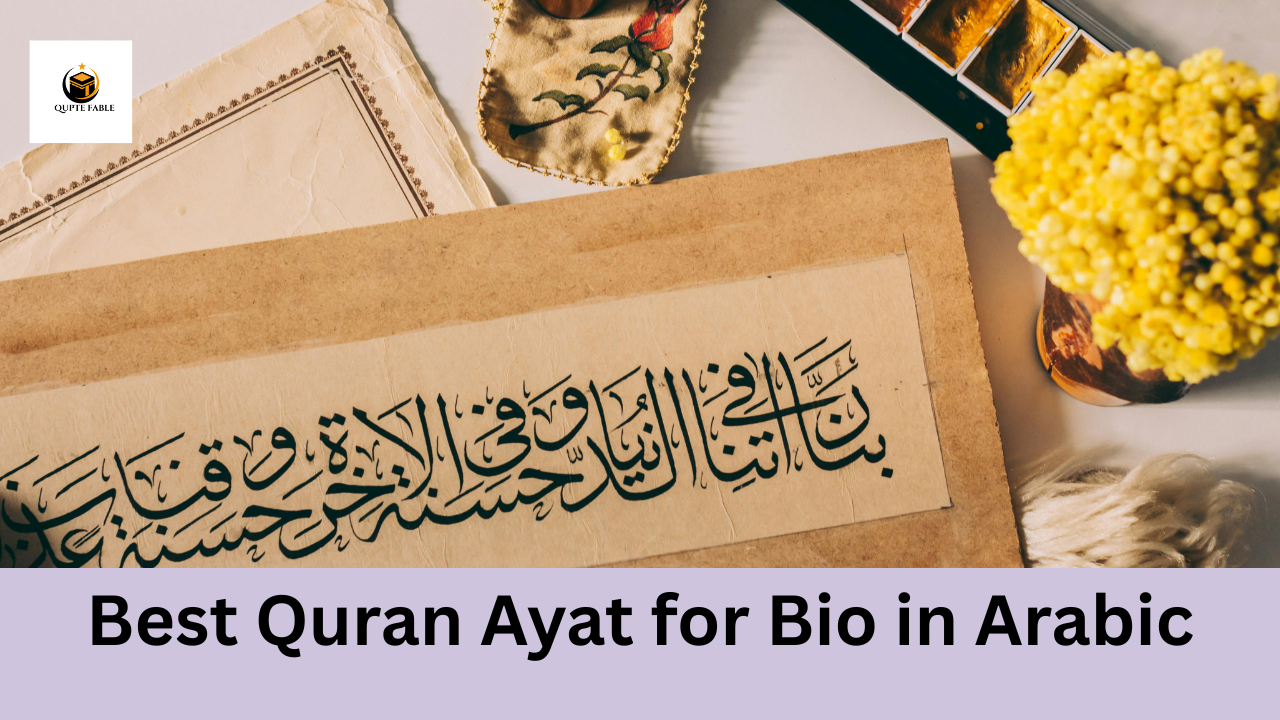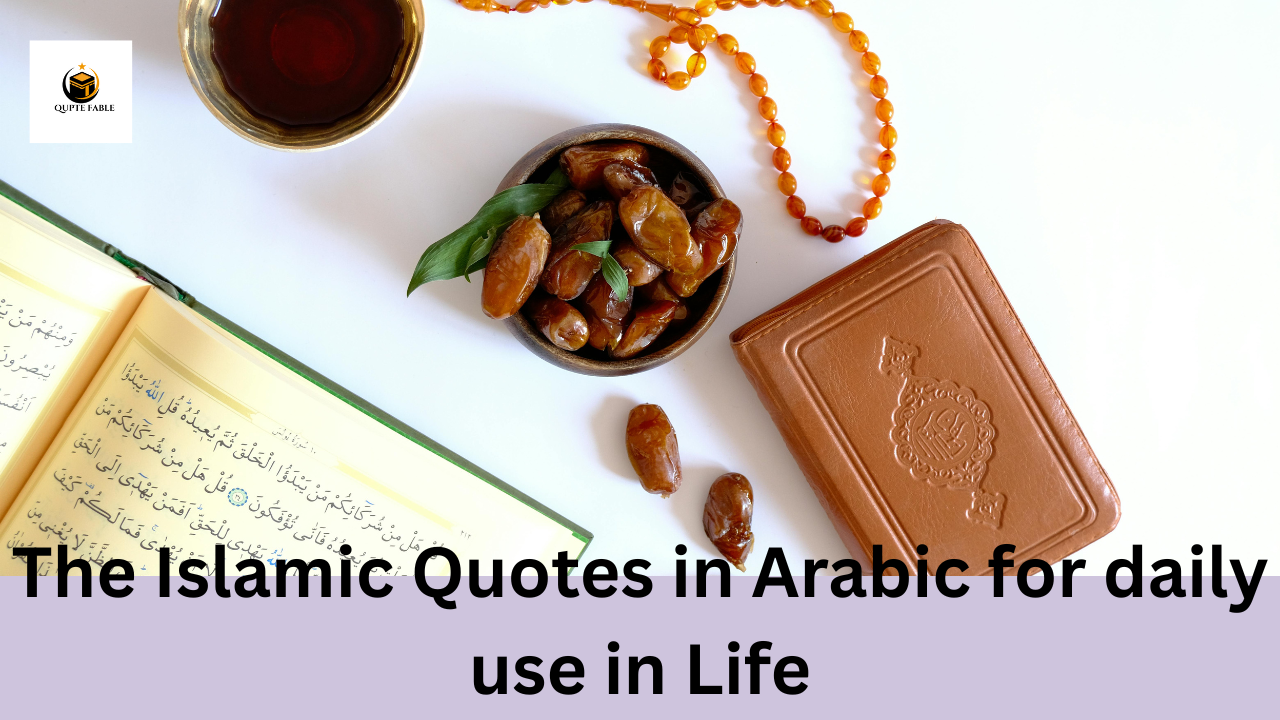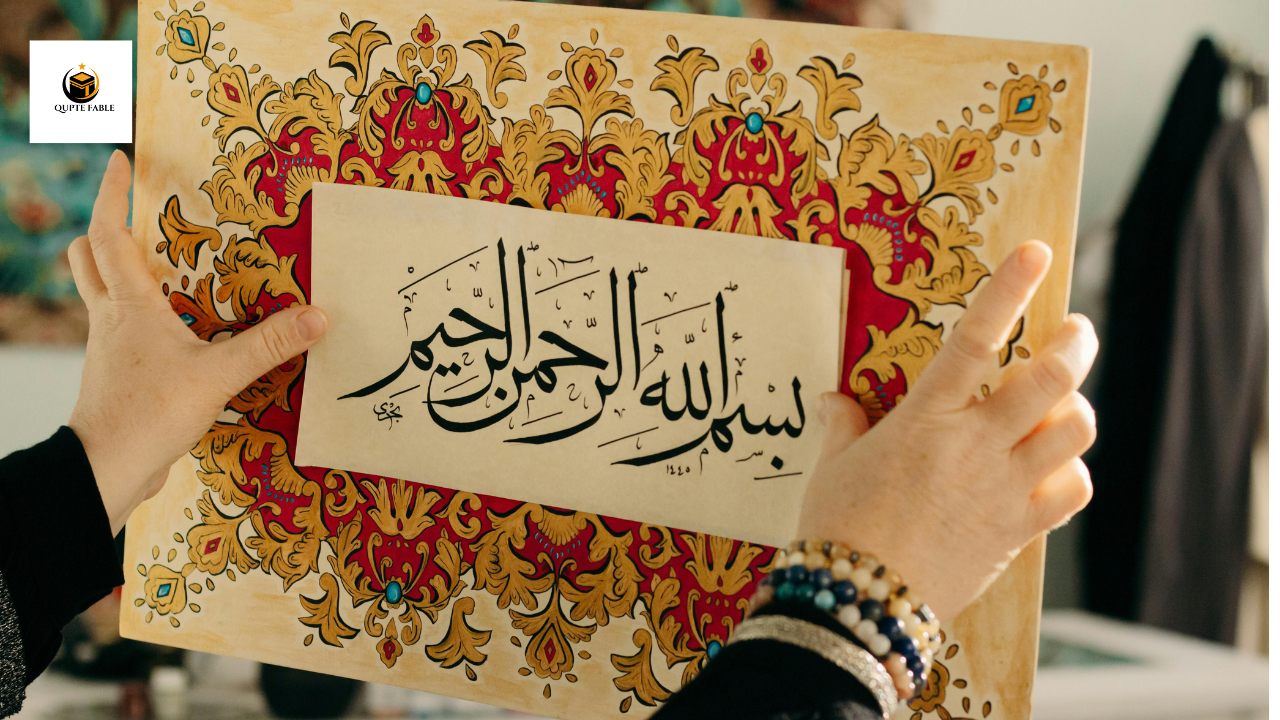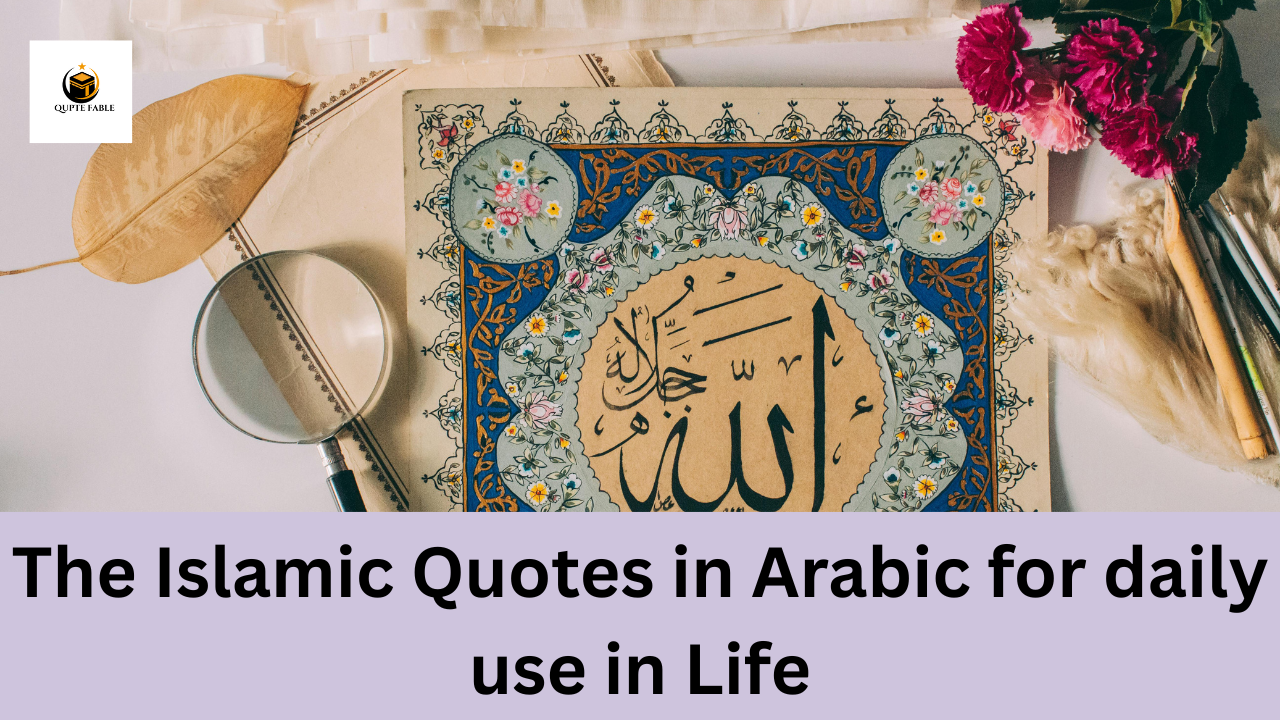In an age characterized by digital noise, fleeting trends, and constant stimulation, the human soul yearns for anchors of meaning, for whispers of the eternal amidst the temporary. For over a billion Muslims worldwide, and for any seeker of truth, this anchor is found in the profound, timeless words revealed by God and articulated by His Messengers and learned scholars. These words, particularly in their original Arabic, are not mere phrases; they are vessels of divine light, capsules of wisdom that have the power to transform hearts, guide actions, and provide solace in the most turbulent of times.The Islamic Quotes in Arabic into the Modern Tapestry of Life
Integrating these Islamic quotes into our modern lives—especially in spaces like social media bios, personal reminders, or daily affirmations—is more than an aesthetic choice. It is a conscious act of faith, a personal pledge to align one’s digital and physical identity with divine principles. It is a way to carry a piece of the mosque, the serenity of prayer, and the clarity of revelation into every corner of our existence. This article delves deep into this practice, exploring a curated selection of powerful quotes from the Quran, Hadith, scholarly wisdom, and devotional supplications (duas), unpacking their layers of meaning and offering guidance on how to live by them.

Best Quran Ayat for Bio in Arabic
The Quran is the literal word of God, a miracle of eloquence, guidance, and mercy. Its verses (ayat) are the ultimate source of truth and the most powerful statements a believer can embody. Choosing a Quranic verse for a bio is to make a declaration about one’s core values and source of strength.
- وَإِن تَصْبِرُوا۟ وَتَتَّقُوا۟ فَإِنَّ ذَٰلِكَ مِنْ عَزْمِ الْأُمُورِ
Meaning: “And if you are patient and fear Allah, indeed, that is of the matters [worthy] of resolve.” (Surah Ali ‘Imran, 3:186)This verse emerges in a context where believers are being prepared for the realities of life: they will be tested, they will hear hurtful words, and they will face oppression. Allah does not promise to immediately remove these hardships. Instead, He provides the formula to overcome them: Sabr (patience) and Taqwa (God-consciousness). Patience here is not a passive waiting; it is an active, persevering steadfastness in doing good and avoiding evil despite difficulties. Taqwa is the awareness that Allah is watching, which acts as an internal compass. The verse concludes by elevating this combination to an issue of “great resolution,” meaning it is a marker of strong, determined, and profound character. Using this in a bio signals a commitment to facing life’s challenges with spiritual strength and moral fortitude. - وَمَن يَتَّقِ اللَّهَ يَجْعَل لَّهُۥ مَخْرَجًۭا
Meaning: “And whoever fears Allah – He will make for him a way out.” (Surah At-Talaq, 65:2)This is a profound promise from the Creator of the heavens and the earth. Often, we find ourselves in situations that feel inescapable—financial debt, personal dilemmas, emotional turmoil, or seemingly dead-end problems. This verse assures the believer that the key to liberation is not a clever strategy first, but first and foremost, Taqwa. By prioritizing one’s relationship with Allah, by fulfilling His commands and avoiding His prohibitions, Allah Himself will create a way out from sources one could never anticipate. It is a reminder that divine help is conditional upon our conscious effort to be righteous. This bio quote is a statement of trust (tawakkul) and a declaration that one’s primary strategy for solving problems is spiritual. - فَإِنَّ مَعَ الْعُسْرِ يُسْرًا
Meaning: “For indeed, with hardship [will be] ease.” (Surah Ash-Sharh, 94:5)This short verse is among the most comforting in the entire Quran. It was revealed to Prophet Muhammad (PBUH) during a period of immense personal difficulty to console him. The Arabic language’s nuance is crucial here. It does not say “after” hardship, but “with” hardship. This suggests that ease is intertwined with the difficulty itself; they are not two separate timelines. The relief, the solace, and the solution are already present within the challenge, like two sides of the same coin. Furthermore, the structure of the verse implies that for every single hardship (al-usr), there is not one but two eases (yusra). This is a powerful mantra for resilience and optimism, perfect for a bio to indicate an unwavering positive outlook rooted in divine promise. - وَهُوَ مَعَكُمْ أَيْنَ مَا كُنتُمْ
Meaning: “And He is with you wherever you are.” (Surah Al-Hadid, 57:4)This verse addresses the potential feeling of loneliness or isolation a believer might experience. It is a definitive statement of Allah’s omnipresence through His knowledge, power, and hearing. It is a companionship of a unique nature—He is not physically present, but He is fully aware, fully capable, and fully attentive to every individual in every location at every moment. This is a source of immense comfort for the traveler, the stranger, the one feeling alone in a crowd, or the one engaged in private worship. It is also a sobering reminder of His all-encompassing knowledge, which fosters a sense of accountability. A bio with this verse is a testament to feeling secure and watched over by the Divine at all times. - رَبَّنَآ أَفْرِغْ عَلَيْنَا صَبْرًۭا
Meaning: “Our Lord, pour upon us patience.” (Surah Al-Baqarah, 2:250)This is the prayer of the righteous upon facing a formidable enemy. They did not first ask for victory or strength; they asked for patience to be “poured upon” them. The verb “afrigh” (pour) suggests a abundant, overflowing, and continuous downpour. They understood that with patience, every other virtue follows, and every challenge can be endured. This quote is a humble admission that patience is not a natural trait but a divine gift that must be sought constantly. It is an ideal bio for someone who recognizes their own need for spiritual strength and proactively seeks it from Allah, acknowledging their dependence upon Him.
Hadith Quotes in Arabic with Meaning
The Hadith are the recorded sayings, actions, and approvals of Prophet Muhammad (PBUH). They are the practical embodiment of the Quran’s teachings, providing a detailed roadmap for life. A Hadith in a bio reflects a desire to follow the Sunnah (way) of the Prophet.
- اَلْإِيمَانُ بِضْعٌ وَسَبْعُونَ شُعْبَةً، فَأَفْضَلُهَا قَوْلُ لَا إِلَهَ إِلَّا اللَّهُ
Meaning: “Faith has over seventy branches. The highest of them is the declaration of ‘La ilaha illallah’.”This hadith beautifully elaborates that faith (Iman) is not a monolithic entity but a complex structure with numerous branches. These branches range from the highest, which is the declaration of God’s Oneness, to other aspects like removing a harmful object from the road, modesty, and loving for your brother what you love for yourself. It prevents a reductionist view of religion. It teaches that faith encompasses beliefs, worship, social interactions, and personal conduct. Using this in a bio signifies an understanding that being a Muslim is a holistic endeavor, involving both the testimony of the tongue and the actions of the limbs, all rooted in the core principle of Tawhid (monotheism). - كَلِمَتَانِ خَفِيفَتَانِ عَلَى اللِّسَانِ، ثَقِيلَتَانِ فِي الْمِيزَانِ
Meaning: “Two words are light on the tongue, heavy on the scale: ‘Subhanallah wa bihamdihi, Subhanallahil Adheem’.”The Prophet (PBUH) was a master of offering easy yet immensely rewarding acts to his followers. This hadith is a prime example. The phrases “Glory be to Allah and all praise is due to Him” and “Glory be to Allah, the Almighty” are extremely easy to recite. They do not require any specific time, place, or state of purification. Yet, on the Day of Judgment, when every atom’s weight of good will be counted, these “light” words will carry immense weight and tip the scales in the believer’s favor. This bio quote is a motivation for consistent dhikr (remembrance of Allah) and a reminder that small, consistent acts of worship are highly valued. - اتَّقِ اللَّهَ حَيْثُمَا كُنْتَ
Meaning: “Be conscious of Allah wherever you are.”This is a comprehensive piece of advice. Taqwa (God-consciousness) is often associated with mosques and prayer. This hadith universalizes it. It means to be aware of Allah in the boardroom, on the internet, when alone at home, and when interacting with others. It is this consciousness that prevents a person from sinning when nobody is watching, because they know Allah is watching. It encourages goodness even when it seems to go unnoticed, because Allah takes note. A bio with this quote is a personal commandment to oneself to maintain integrity and piety in all circumstances, public and private. - الْمُسْلِمُ مَنْ سَلِمَ الْمُسْلِمُونَ مِنْ لِسَانِهِ وَيَدِهِ
Meaning: “A Muslim is one from whose tongue and hand other Muslims are safe.”This hadith provides a very practical, behavioral definition of a Muslim. It moves beyond theological definitions to the core of social conduct. A true believer is one who ensures the safety and security of others—physically from their hands and emotionally from their tongue. This includes avoiding gossip, slander, insults, physical harm, and theft. It establishes peace and security as fundamental rights that every Muslim owes to another. This is an excellent bio quote for someone who wants to promote a message of non-violence, peace, and ethical social interaction, defining their identity through the safety they provide. - لاَ يُؤْمِنُ أَحَدُكُمْ حَتَّى يُحِبَّ لأَخِيهِ مَا يُحِبُّ لِنَفْسِهِ
Meaning: “None of you truly believes until he loves for his brother what he loves for himself.”This hadith strikes at the root of hypocrisy, selfishness, and jealousy. It mandates empathy as a condition of complete faith. It’s easy to feel happy for our own success, but the test of genuine faith is to feel the same joy for a brother or sister’s success—a promotion, a new car, a happy marriage—without a hint of envy. Similarly, one would hate for others to be afflicted by the same misfortunes one fears for oneself. This principle creates a society based on mutual care and selflessness. A bio featuring this quote signals a commitment to this high level of empathy and communal love.
Islamic Wisdom Quotes from Scholars in Arabic
The scholars of Islam (Ulama) are the heirs of the prophets. Their wisdom, distilled from a deep understanding of the Quran and Sunnah and refined by life experience, provides practical, psychological, and spiritual insights.
- مَنْ عَرَفَ نَفْسَهُ اِتَّضَعَ فِي نَفْسِهِ
Meaning: “Whoever knows himself will become humble in his own eyes.”This statement, attributed to many scholars, is a cornerstone of spiritual development. True self-knowledge involves recognizing one’s origins (from a drop of fluid), one’s flaws, one’s ignorance, and one’s utter dependence on Allah for every breath and blessing. This recognition automatically dismantles arrogance, pride, and a sense of superiority. When one is aware of their own inner weaknesses, they become less likely to judge others harshly. This quote is a powerful antidote to ego, perfect for someone on a path of self-improvement and humility. - الصَّبْرُ عِنْدَ الصَّدْمَةِ الْأُولَى
Meaning: “Patience is at the first shock.”The true test of patience is not after one has had time to process grief, but in the immediate, jarring moment of calamity—the “first shock.” This is when the heart is most vulnerable and the tongue is most likely to utter something displeasing to Allah. The highest form of patience is to immediately say, “Inna lillahi wa inna ilayhi raji’un” (Indeed, to Allah we belong and to Him we shall return) and to accept Allah’s decree from the very first moment. This quote calls for a proactive, spiritually disciplined response to life’s inevitable trials. - مُجَالَسَةُ الصَّالِحِينَ تُورِثُ الصَّلاحَ
Meaning: “Keeping the company of the righteous results in righteousness.”This wisdom highlights the immense impact of one’s environment and social circle. Human beings are inherently influenced by those around them. Sitting with those who remember Allah, discuss beneficial knowledge, and engage in good deeds naturally inclines one’s heart toward the same. Their good character rubs off, their conversations inspire, and their company protects one from sin. Conversely, bad company normalizes misbehavior. This quote is a crucial reminder to be intentional about one’s friendships, choosing those who elevate one’s faith. - الدُّنْيَا سَاعَةٌ فَاجْعَلُوهَا طَاعَةً
Meaning: “The world is but an hour, so make it obedience.”This poetic statement frames the entire lifespan, which feels long, as a single, fleeting hour. It is a metaphor for the transience of worldly life compared to the eternity of the Hereafter. Understanding this brevity is the key to prioritizing correctly. If life is so short, then the wisest investment is to spend every possible moment of it in obedience to Allah—through prayer, charity, kindness, and seeking knowledge. This quote is a mantra against procrastination in worship and a call to spiritual urgency. - الْعِلْمُ يُرْشِدُكَ وَالْعَمَلُ يُبَلِّغُكَ
Meaning: “Knowledge guides you, and action takes you to your goal.”This wisdom clarifies the relationship between knowledge and action. Knowledge is the map and the compass; it shows you the right direction and warns you of pitfalls. However, merely holding the map does not get you to your destination. You must walk—you must act. It is the combination of sound knowledge and righteous action that leads to the ultimate goal: the pleasure of Allah and Paradise. One without the other is deficient. This is an ideal quote for students and practitioners of faith, reminding them that learning must always be coupled with implementation.

The Islamic Quotes in Arabic for daily use in Life
Dua (supplication) is the weapon of the believer and the core of worship. These quotes are not just for reading; they are prayers to be internalized, memorized, and recited with presence of heart.
- رَبَّنَا هَبْ لَنَا مِنْ أَزْوَاجِنَا وَذُرِّيَّاتِنَا قُرَّةَ أَعْيُنٍ
Meaning: “Our Lord, grant us from among our spouses and offspring comfort to our eyes.”This beautiful dua, prayed by the righteous servants in the Quran, goes beyond asking for just any family. It asks for a family that is qurratu a’yun—a coolness of the eyes. This is an Arabic idiom for something that brings ultimate joy, comfort, and peace. It is a prayer for a righteous spouse and children whose good character, piety, and love are a constant source of happiness and tranquility in this life and a means of reward in the next. It is the ultimate prayer for familial bliss. - رَبِّ اشْرَحْ لِي صَدْرِي وَيَسِّرْ لِي أَمْرِي
Meaning: “My Lord, expand for me my breast [with assurance] and ease for me my task.”This was the prayer of Prophet Musa (AS) before his daunting mission to Pharaoh. “Expanding the breast” means removing anxiety, filling the heart with peace, courage, and conviction. “Easing the task” means removing obstacles and making the path smooth. This is the perfect dua for anyone facing a difficult challenge—exams, a new job, a difficult conversation, or any moment of doubt and anxiety. It asks for both internal courage and external facilitation. - رَبَّنَا لَا تُزِغْ قُلُوبَنَا بَعْدَ إِذْ هَدَيْتَنَا
Meaning: “Our Lord, do not let our hearts deviate after You have guided us.”This is a profound and protective prayer from Surah Ali ‘Imran, taught by Allah Himself. It acknowledges that guidance is a gift from Allah. However, the human heart is vulnerable and can be swayed by desires, doubts, and temptations. This dua is a plea for steadfastness. It is asking Allah to fortify one’s heart and protect it from deviating from the straight path after having been blessed with faith. It reflects a deep understanding of one’s own weaknesses and a total dependence on Allah to preserve one’s faith. - اللَّهُمَّ إِنِّي أَسْأَلُكَ عِلْمًا نَافِعًا
Meaning: “O Allah, I ask You for beneficial knowledge.”Not all knowledge is equal. One can have knowledge that brings no good or even leads to arrogance. The Prophet (PBUH) frequently asked Allah for knowledge that is Nafi‘—beneficial. Beneficial knowledge is that which increases one in humility, fear of Allah, and good deeds. It is knowledge that is understood, acted upon, and shared for Allah’s sake. This simple yet comprehensive dua should be the prayer of every student, teacher, and seeker of knowledge. - اللَّهُمَّ أَصْلِحْ لِي دِينِيَ الَّذِي هُوَ عِصْمَةُ أَمْرِي
Meaning: “O Allah, rectify for me my religion, which is the safeguard of my affairs.”This dua prioritizes perfectly. It asks Allah to fix and set right one’s religion above all else. Why? Because religion (deen) is ‘ismatu amri—the safeguard, the protection, and the anchor of all one’s affairs. If one’s relationship with Allah is correct, everything else—worldly affairs, family life, mental peace—finds its proper place and is blessed. If the religion is corrupt, nothing else can be truly right. This is a master prayer that encompasses all goodness, asking for the rectification of the very core of one’s existence.
FAQ About Islamic Quotes in Arabic with Meaning
Why use Arabic quotes for social media bios?
Using Arabic quotes connects your digital identity directly to the divine language of the Quran and the tradition of the Prophet (PBUH). It’s a way to honor the original text, as translations, however accurate, can never fully capture the eloquence and depth of the Arabic. In a space often filled with vanity and triviality, it plants a flag of faith, spreading a message of wisdom and remembrance of Allah (dhikr) to all who visit your profile. It transforms your bio from a mere description into a source of sadaqah jariyah (ongoing charity) as it may remind, inspire, or guide others.
How do I choose the right Islamic quote?
The best quote is one that resonates with your current spiritual state, challenges, or aspirations. Reflect on what you need most: patience? guidance? gratitude? protection? Let your choice be a form of self-therapy and a personal mission statement. For example, if you are going through a hard time, “فَإِنَّ مَعَ الْعُسْرِ يُسْرًا” is ideal. If you want to focus on character, “الْمُسْلِمُ مَنْ سَلِمَ الْمُسْلِمُونَ” is perfect. The quote should speak to your heart and serve as a constant, gentle reminder of your goals.
Is it important to include the meaning?
Absolutely. Including an accurate and concise translation is crucial for several reasons. First, it fulfills the responsibility of conveying the message correctly, so you are not sharing something mysterious. Second, it maximizes the benefit by allowing non-Arabic speakers to understand and be inspired. Third, it educates and invites others to learn. It ensures the purpose of the quote—guidance and reminder—is fulfilled for a wider audience. It is an act of sincerity and kindness.
Can these quotes bring barakah (blessing)?
Yes, invoking the words of Allah and His Messenger (PBUH) is a means of inviting divine blessings (barakah) into your life and your digital spaces. Barakah is a concept of divine grace that increases the goodness and spiritual value of something. By dedicating a part of your profile to the remembrance of Allah, you are seeking His pleasure in that domain, which can lead to increased blessings in your online interactions, your followers, and the overall benefit derived from your social media use.
What is the etiquette of posting Islamic quotes?
The primary etiquette is sincerity (Ikhlas). The intention should be to please Allah, remind oneself and others, and spread goodness—not to gain likes, appear pious, or for show. Secondly, one must ensure the quote is authentic, especially with Hadith, and that the translation is as accurate as possible to avoid misrepresentation. It’s also good practice to cite the source (e.g., Surah and verse number for Quran). Finally, the poster should strive to embody the values in the quote themselves, aligning their online presence with their offline characterconclusion:
conclusion:
Islamic quotes in Arabic, paired with their meanings, are far more than decorative text. They are a lifeline to the divine in the digital age, a means of carrying the mosque in our pockets. They provide a framework for navigating modern complexities with ancient wisdom, offering solace, guidance, and a constant reminder of our ultimate purpose. Each quote is a seed of faith that, when planted in the heart and shared with the world, can grow into a tree of righteousness, providing shade and fruit for the poster and all who encounter it. By integrating these powerful words into our online bios and, more importantly, into our daily lives, we weave a tapestry of faith that connects our fleeting worldly moments to the eternal reality of the Hereafter.

Final Dua
rاللَّهُمَّ اجْعَلْنَا مِنَ الَّذِينَ يَسْتَمِعُونَ الْقَوْلَ فَيَتَّبِعُونَ أَحْسَنَهُ
Meaning: “O Allah, make us among those who listen to speech and follow the best of it.” A prayer to be among those who are discerning, who seek out truth, and who have the humility and wisdom to act upon the best guidance they receive.
رَبَّنَا تَقَبَّلْ مِنَّا إِنَّكَ أَنتَ السَّمِيعُ العَلِيمُ
Meaning: “Our Lord, accept [this] from us. Indeed, You are the Hearing, the Knowing.” A humble plea for Allah to accept our humble efforts in learning, sharing, and striving to live by these sacred words, acknowledging that He alone knows our true intentions.
اللَّهُمَّ انْفَعْنَا بِمَا عَلَّمْتَنَا وَعَلِّمْنَا مَا يَنْفَعُنَا
Meaning: “O Allah, benefit us by what You have taught us and teach us that which will benefit us.” A prayer that the knowledge we gain is not just theoretical but is truly beneficial, and that we are guided to continue learning what will bring us closer to You.
رَبَّنَا آتِنَا فِي الدُّنْيَا حَسَنَةً وَفِي الآخِرَةِ حَسَنَةً
Meaning: “Our Lord, give us in this world good and in the Hereafter good.” The comprehensive, all-encompassing prayer for goodness in every aspect of life—faith, health, provision, family—and the ultimate good: success in the Hereafter and admission into Paradise.
وَارْزُقْنَا وَأَنْتَ خَيْرُ الرَّازِقِينَ
Meaning: “And provide for us, and You are the best of providers.” An acknowledgment that all provision—material and spiritual—comes from Allah alone, and He is the most generous and wise source to rely upon for all our needs.
Please read the related post; What is the meaning of the Islamic Perspective on Friendship?

